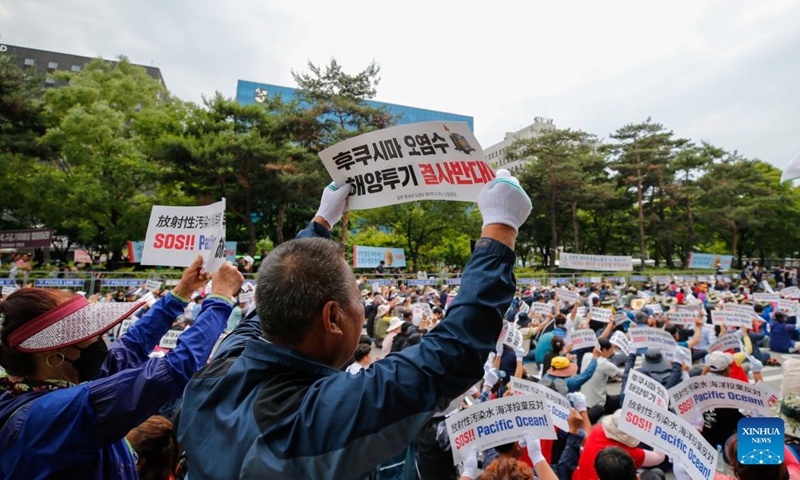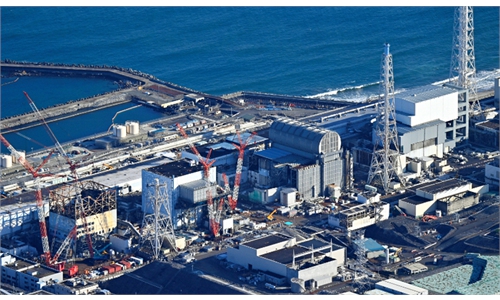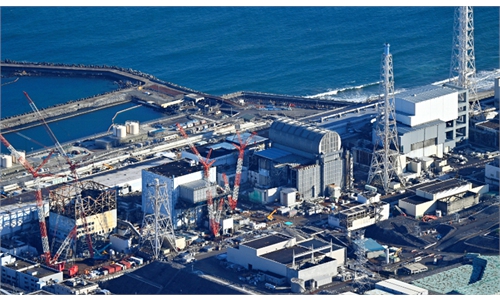Fury rises as Japan starts radioactive water dumping trial
Associations, businesses call for comprehensive suspension of Japanese food imports

People rally to protest against Japan's planned discharge of radioactive wastewater in Seoul, South Korea, June 12, 2023. Thousands of South Korean fishermen gathered on Monday near the parliamentary building in Seoul to clamor against Japan's planned discharge of radioactive wastewater from its crippled Fukushima Daiichi nuclear power plant into the Pacific Ocean(Photo: Xinhua)
Associations and industry insiders from China's Hong Kong, Macao, Taiwan and the mainland are holding fierce protests and voicing their fury and opposition toward Japan's irresponsible radioactive water dumping plan, urging decision makers to suspend relevant food imports and warning Japan to stop its reckless deeds in time to avoid an irreversible situation, as the operator of the crippled Fukushima Daiichi nuclear power plant started trial operations in preparation for dumping, the Global Times learned on Tuesday.
Tokyo Electric Power Co (TEPCO), the operator of the wrecked Fukushima nuclear plant, began tests on Monday of its newly constructed facilities for dumping nuclear-contaminated water into the Pacific Ocean, AP reported. The trial is expected to continue for about two weeks before dumping the harmful water.
The Chinese Foreign Ministry slammed Japan's move as a step toward unilaterally forcing the dumping of nuclear-contaminated water against the common will of the international community.
Wang Wenbin, spokesperson for the Chinese Foreign Ministry, said the matter cannot be solely decided by Japan, and that Japan's insistence on pushing ahead with the plan is irresponsible and unwelcome. The "delicately packaged" plan cannot conceal Japan's intention of shifting risks, Wang said.
Discharging contaminated water into the ocean is not the only option for dealing with the Fukushima nuclear disaster, nor is it the safest or most optimal solution, the spokesperson said. Japan's decision to choose economic costs over safety is equivalent to transferring the risk of nuclear contamination to all of humanity.
Even data released by Japan itself shows that nearly 70 percent of the "treated" nuclear-contaminated water still cannot meet standards, Wang said.
China strongly urges Japan to fulfill its international obligations and stop forcibly promoting the dumping plan in time to avoid creating an irreversible situation, the spokesperson noted.
The Hong Kong Federation of Trade Unions arrived at the Japanese Consulate-General for the third time on Monday to petition against the trial run, but regrettably the Japanese government chose to ignore voices of opposition despite their repeated calls.
Chan Wing-yan, Legislative Council member of the union, told the Global Times on Tuesday that the selfish behavior of Japan to pollute the ocean with nuclear-contaminated water will harm marine life globally, and she hopes that Tokyo would provide a clear explanation for its deeds.
"Even before the dumping starts, the cesium levels of fishery products in the Fukushima water area had already exceeded Japan's food safety standards by a staggering 180 times, indicating that Japan's purification equipment is insufficient to ensure that seawater is not contaminated," Chan said.
"The Japanese government's claim that it can effectively purify the contaminated water is absurd."
In Macao, the Administration Committee on Municipal Affairs of the Municipal Affairs Bureau said that it is closely monitoring Japan's move and is in close contact with the General Administration of Customs and neighboring regions to keep up with the latest developments.
If Japan proceeds with the discharge of nuclear-contaminated water, the Municipal Affairs Bureau of the Macao SAR will immediately expand the scope of import suspensions to include nine high-risk districts in Japan, including seafood, vegetables and fruits from Tokyo and Chiba Prefecture.
It will also require radiation testing certificates and implement relevant inspection and quarantine measures before allowing the import of fresh food from other counties and districts of Japan.
Across the Straits in the Taiwan island, its opposition Labor Party staged a protest on Tuesday at the Japan-Taiwan Exchange Association in Taipei, expressing grave concerns, while calling on the Democratic Progressive Party (DPP) authorities to take the issue seriously.
Wang Wu-lang, secretary-general of the Labor Rights Association, who participated in the demonstration, told the Global Times that the DPP authorities have intentionally viewed Japan's wastewater dumping plan as a strengthening of its "anti-China" route, so it they condoned and tolerated it.
"For the long-term interests of human society, the DPP authorities must say 'no' to the irresponsible actions of the Japanese government!" Wang said.
In a statement sent to the Global Times on Tuesday, the Labor Party said that as many regions across the world expressed condemnation of Japan's irresponsible behavior, the DPP authorities, who have always been vocal about being "anti-nuclear", chose to turn a blind eye, despite the serious threat posed to food safety and the environment of the Taiwan residents.
The DPP even opened the door to importing "nuclear-contaminated food" from Japan, hoping to sacrifice the safety and health of the people in exchange for Japan's support for its delusional dream of joining the Comprehensive and Progressive Agreement for Trans-Pacific Partnership.
Industry representatives in China also expressed deep anger in the face of the Japanese move, with some calling for counteractions.
The head of a Chinese fisheries industry association told the Global Times that "we should consider a suspension of the current bilateral cooperation between Chinese and Japanese fisheries industries and a halt to corresponding trade related to fishery."


